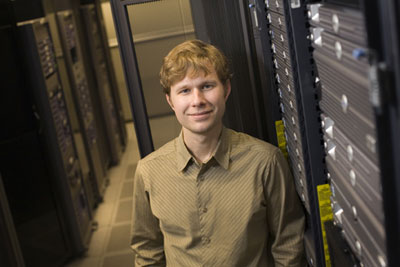While supporting others' research, CNF's Derek Stewart pursues his own in nanoscale heat transfer
By Anne Ju

Walk into a roomful of high-performance computer servers, and it's hard to hear over the din of fans -- the only things keeping the servers, consuming thousands of watts of power, from overheating.
Wouldn't it be cool if computers didn't overheat?
Quick dissipation of heat at the smallest, most fundamental scales of electronic devices is just one way that the work of Derek Stewart may someday change the face of computing and other electronics.
"Instead of using fans to blow air across and take that energy and move it away, you can actually do something on the surface of your system to cool it down," said Stewart, computational research associate at the Cornell NanoScale Science and Technology Facility (CNF).
His primary responsibility is supporting CNF users with his expertise in computational modeling. He takes publicly available computational codes for such things as calculating electronic properties of materials or microfluidic flows of various devices and makes them accessible to CNF's worldwide users. But beyond that, he hopes his own research in the area of nanoscale heat transfer may lead to unique codes that other researchers could also use.
Stewart's expertise complements CNF's nanofabrication capabilities by allowing users to model devices before they build them, or to understand why their devices behave like they do, explained George Malliaras, the Lester B. Knight Director of CNF. To keep them current in their fields, research associates are also encouraged to pursue their own research, Malliaras said.
Since 2005, CNF users have been able to perform large-scale simulations and computations to accompany their physical experimentation in the lab, thanks to a cluster of 56 dual-processor computer nodes. Stewart, as manager of this network, supports researchers by helping them modify existing codes, as well as come up with new ones.
As someone who tries to understand atomic principles by modeling them, Stewart works in a research world that is largely theoretical. But learning how materials transfer heat on the nanoscale, he explained, can then lead to understanding of the best materials and methods to use. Current computational models of thermal conductivity are still crude, according to Stewart, in part because it is difficult to map the scattering of heat across phonons -- lattice vibrations of atoms -- which carry heat.
Stewart has been using an approach called density functional theory to determine the relationship between atoms in materials as well as what causes phonon scattering. By putting these terms in a larger-scale computer model, he has been able to predict the thermal conductivity of silicon and germanium, which are widely used in the semiconductor industry.
Stewart has also contributed to collaborative research that shows carbon nanotubes, which are super-strong cylindrical carbon molecules, hold great promise for nanoscale heat transfer because the strong bonds between carbon atoms lead to a very high thermal conductivity. But what happens when a nanotube isn't perfect? Stewart and researchers from Boston College, University of Regensburg and CEA-Grenoble have set out to answer that by examining how impurities and defects in carbon nanotubes reduce thermal conductivity.
The ideal situation is to have phonons transmit as much heat as possible away from the circuit or whatever the device might be. The researchers found that heat transfer through a nanotube can be dramatically reduced by locally distorting its symmetry.
Stewart, who came to Cornell in 2004 after a postdoctoral fellowship at Sandia National Laboratories in California, said he was attracted to the idea of pursuing research that would also support other researchers at CNF.
"It makes me focus not just on research at Cornell, but also on drawing people in from other institutions to make sure they get research done here," he said.
People interested in doing simulation work at CNF or learning more about Stewart's research can visit http://www.nnin.org/nnin_compsim.html or contact him directly at stewart@cnf.cornell.edu.
Media Contact
Get Cornell news delivered right to your inbox.
Subscribe